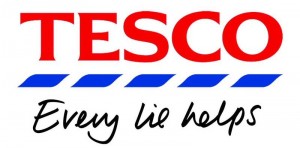Tesco Goes “Green” – Continues To Sell Crap To The Masses
Posted by keith on February 3rd, 2010
This is classic greenwash. Vintage greenwash, in fact.
Tesco, the British supermarket giant headed by Sir Terry Leahy (knighted for services to corporate power), has announced that one of their 2,360 stores is to become carbon neutral. I assume, obviously, that this carbon neutrality includes the things they sell in the store, rather than just the operational carbon, otherwise you could be excused for thinking that – heaven forbid – this is a PR stunt.
The story is taken up by Julia Finch in The Guardian, who opens with a cracking statistic…
Supermarket group Tesco, which pumps out some four million tonnes of carbon a year, today opened its first zero carbon store as part of its bid to be a carbon neutral company by 2050.
The shop, in Ramsey, Cambridgeshire, is timber-framed rather than steel, and uses skylights and sun pipes to cut lighting costs. It also has a combined heat and power plant powered by renewable bio-fuels, exporting extra electricity back to the national grid. In addition the refrigerators – one of the biggest blackspots for food retailers trumpeting their green credentials – have doors to save energy and harmful HFC refrigerant gases have been replaced.
Tesco chief executive Sir Terry Leahy said: “It shows that you can dramatically alter how much carbon you use and life can go on”.
The new store, he said, “cost 30% more to build, but it uses 50% less energy, and with oil at $70 a barrel it is a business case in itself”.
To coincide with the Ramsey opening, the supermarket chain said it intended to spend more than £100m with green technology companies, although Leahy was unsure of the level of supermarket’s current spend on this.
Tesco has been at the forefront of the grocers’ race to be green. The UK’s biggest supermarket has provided £25m of funding for the University of Manchester to set up a sustainable consumption institute, and has a 10-point community plan, with pledges to increase local sourcing and to consult local communities in an attempt to be viewed as a good neighbour.
Apart from the obvious dissonance between Tesco’s 2,360 stores that rip the heart out of communities wherever they are located – and, believe me, they are not located in order to develop a harmonic relationship with any community – there is the small matter of what Tesco sells.
In 2009, Tesco had a turnover – essentially a measure of how much stuff they sell – of £59.4 billion, an increase of 15.1% on the previous year. Of that vast amount, £41.5 billion is from UK sales, with the remaining £18 billion accounted for by supermarkets in Thailand (614 stores), China (50 “hypermarkets”), Ireland (117), South Korea (280), Japan (137), Turkey (100), Poland (313) and the USA (113).
As the “green” store is in the UK, we should focus on Tesco’s activities there: so we see £28.5 billion coming from food retailing – what is considered the Core Business – and the bulk of the remainder from non-food retail (clothes, electrical goods, homeware etc).
If you live in the UK, I want you to go into a Tesco store and pick ten items at random, both food and non-food, then try and find out where the items were manufactured, grown or otherwise produced. You’re going to have an interesting time with food because, like most food in supermarkets, the items contain a huge variety of different ingredients emanating from all across the globe: simplicity is not in the nature of mass food retailing. Fruit, vegetables and other single-source items will invariable be a mix of local (ish) and from much further away; but you can be assured that even “local” items will have been moved from one end of the country to the other a couple of times for warehousing and distribution before reaching the store.
Non-food items are made, basically, in China.
Tesco’s Carbon Disclosure (via http://www.cdproject.net) is interesting, to say the least, and it’s well worth repeating here:
8.1. Please indicate the category that describes the company, entities, or group for which Scope 1 and Scope 2 GHG emissions are reported.
Companies over which operational control is exercised.
8.2. Please state whether any parts of your business or sources of GHG emissions are excluded from your reporting boundary.
Production of goods, supplier transport, international freight, asset sites, waste recycling and disposal, employee commuting, customer transport, consumption and disposal of goods.
So while they are honest about their “direct” emissions, they completely ignore the thing that accounts for the bulk of Tesco’s emissions: the production and transportation of the things they sell.
The aforementioned four million tonnes of carbon dioxide is, large as it seems, only the tip of Terry’s toxic iceberg.
Why should this be a problem, given that the companies that make and transport the stuff should be disclosing and accounting for their emissions? Because Tesco is a huge company, and for the most part, if they did not exist to sell people overprocessed, long-haul, extraneous and unnecessary things that people would not buy were they not marketed by Tesco’s gigantic marketing machine, the emissions simply would not be produced. But, hey! They have a carbon neutral store, so that’s ok, isn’t it?
Tesco: every lie helps.





